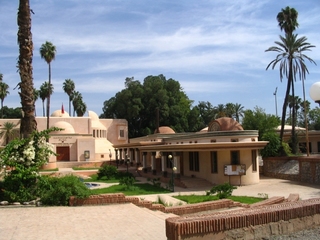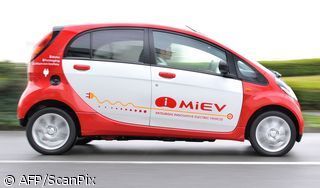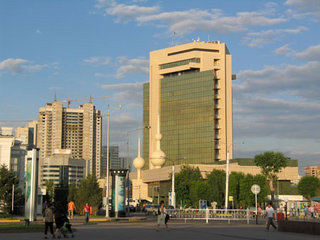For several years the position of Polish exporters on the markets of the former Commonwealth of Independent States has been clearly weakening
Published:
5 May 2003 y., Monday
In order to spur on trade, presentations of Polish exporters are gaining popularity. One such presentation is the Polish National Exhibition in St. Petersburg.
Geographic proximity, relatively small competition from local manufacturers who are not capable of satisfying the growing demand for modern products and, contrary to common belief, the increasingly wealthy and demanding customer, are the advantages of the "eastern market." Why then does trade with the countries of the Commonwealth of Independent States (CIS) constitute as little as 7.1 percent of the global value of Polish export?
The position of Polish companies is weakened by competition from the Western businesses that are perfectly aware of the perspectives which an active and strategically planned entry into Eastern markets can accomplish. Entrepreneurs from Germany, France and the United States, supported by the appropriate funds, first promote and then successfully sell their products in Russia and Ukraine or make direct investments there.
The decrease in the amount of Polish agriculture and food products exported to Eastern markets has stemmed from the fact that big international concerns such as Nestlé, Danone or Unilever directly entered this strategic area. However, the issue of Western competition is only a part of the answer to this question and the possibility of development for Polish exporters on the markets in the former Soviet Union.
One of the most serious difficulties Polish companies encounter is a considerable risk connected with signing commercial contacts with partners from the East who frequently appear to be insolvent and do not honor their contracts. According to Robert Stawski from the Promotion Chamber of the Polish Chamber of Commerce, businesspeople from Russia frequently do not understand the term "advance payment" and sometimes want to pay for the products only after they sell them. For obvious reasons, these terms are hard to accept for Polish manufacturers, which are mostly small and medium-sized companies. The state does not guarantee any protection for companies against situations in which partners from Russia, Belarus or Ukraine do not fulfill the terms of a commercial contract.
Šaltinis:
warsawvoice.pl
Copying, publishing, announcing any information from the News.lt portal without written permission of News.lt editorial office is prohibited.
The most popular articles
 On 11 February, heads of state or government of European Union member states will meet in Brussels to seek a commitment towards implementing a revitalised economic strategy to boost employment and growth in the EU.
more »
On 11 February, heads of state or government of European Union member states will meet in Brussels to seek a commitment towards implementing a revitalised economic strategy to boost employment and growth in the EU.
more »
 International Monetary Fund forecasts that Lithuania’s economy will grow 1.6 % this year, making it “the only one of the three Baltic economies expected to be in the positive territory in 2010”.
more »
International Monetary Fund forecasts that Lithuania’s economy will grow 1.6 % this year, making it “the only one of the three Baltic economies expected to be in the positive territory in 2010”.
more »
 Raynair announced it would open its 40th and 1st Central European base at Kaunas, Lithuania’s second largest city, in May with 2 based aircraft and 18 routes.
more »
Raynair announced it would open its 40th and 1st Central European base at Kaunas, Lithuania’s second largest city, in May with 2 based aircraft and 18 routes.
more »
 A new Partnership Strategy for Morocco has been approved by the Board of Executive Directors of the World Bank.
more »
A new Partnership Strategy for Morocco has been approved by the Board of Executive Directors of the World Bank.
more »
 The electric car is an opportunity for European industry.
more »
The electric car is an opportunity for European industry.
more »
 The EBRD’s Board of Directors has adopted a new strategy for Kazakhstan, which reinforces the Bank’s commitment to further support the Kazakh economy and sets out the priorities for its activities in the country over the next three years.
more »
The EBRD’s Board of Directors has adopted a new strategy for Kazakhstan, which reinforces the Bank’s commitment to further support the Kazakh economy and sets out the priorities for its activities in the country over the next three years.
more »
 The European Commission has authorised, under EU state aid rules, plans notified by Sweden to provide a guarantee that would enable Saab Automobile AB to access a loan from the European Investment Bank (EIB).
more »
The European Commission has authorised, under EU state aid rules, plans notified by Sweden to provide a guarantee that would enable Saab Automobile AB to access a loan from the European Investment Bank (EIB).
more »
 At the informal meeting of the Ministers of Competitiveness (Science and Industry), to be held between 7 and 9 February in San Sebastian, the issues on the table will include placing science at the top of the EU agenda and showcasing its role in economic recovery, as well taking the debate on the electric vehicle to EU level.
more »
At the informal meeting of the Ministers of Competitiveness (Science and Industry), to be held between 7 and 9 February in San Sebastian, the issues on the table will include placing science at the top of the EU agenda and showcasing its role in economic recovery, as well taking the debate on the electric vehicle to EU level.
more »
 The Executive Board of the International Monetary Fund (IMF) today approved a 27-month Stand-By Arrangement with Jamaica in the amount of SDR 820.5 million (about US$1.27 billion) to support the country’s economic reforms and help it cope with the consequences of the global downturn.
more »
The Executive Board of the International Monetary Fund (IMF) today approved a 27-month Stand-By Arrangement with Jamaica in the amount of SDR 820.5 million (about US$1.27 billion) to support the country’s economic reforms and help it cope with the consequences of the global downturn.
more »
 Mr. Nadeem Ilahi, chief of an International Monetary Fund (IMF) staff mission to the Kyrgyz Republic, issued the following statement today in Bishkek.
more »
Mr. Nadeem Ilahi, chief of an International Monetary Fund (IMF) staff mission to the Kyrgyz Republic, issued the following statement today in Bishkek.
more »